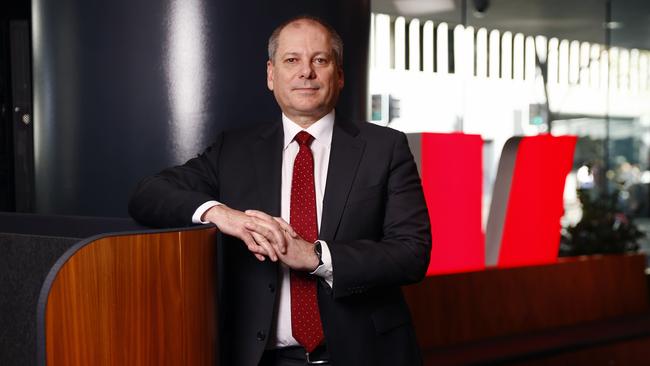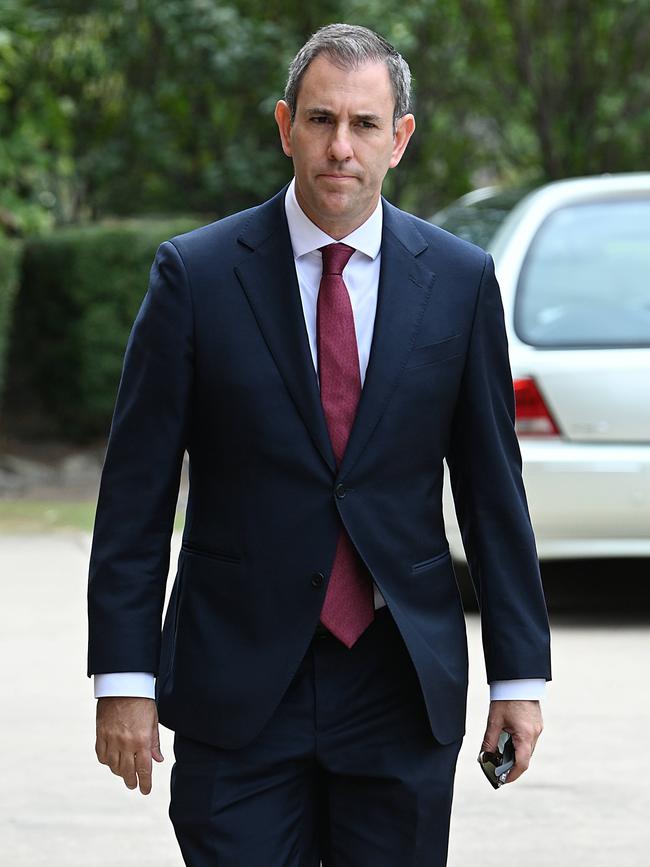Westpac profit surges, but CEO warns of economic risks ahead
Peter King says Australia is at risk of prolonged inflation and high interest rates due to housing and green investment demands.
Westpac warned that Australia risks higher-for-longer inflation and interest rates due to housing and green investment demands, with chief executive Peter King calling for governments to coordinate policy to ease a burden on the economy.
Speaking after posting a 26 per cent jump in annual profit to $7.19bn, Mr King warned that intense demand for housing, on top of infrastructure projects and energy transition investments, could trigger further increases in inflation and interest rates.
“Prioritisation at the national and the state level is critical to get everything done,” he told The Australian in an interview.
“There’s big demand for infrastructure, there’s big demand for the energy transition, (and) there’s demand for more housing. If that does happen, interest rates will probably need to be higher than what we’re thinking.”
Mr King’s comments come ahead of an expected hike in the cash rate by the Reserve Bank on Tuesday from 4.1 per cent in a bid to tame inflation. The International Monetary Fund has called for governments to delay or cancel some less urgent projects to try to abate inflation.
“The risk is that interest rates stay higher for longer, as we’ve still got a lot of domestic demand to do things that are really important in the economy,” Mr King said.
“If you think about housing construction at the moment, we don’t have enough people to build the houses that we need. And we need a plan of attack that covers: where do we get the skilled labour from?”
Mr King also emphasised that immense demand for materials to drive the energy transition, stressing the urgent need to coordinate a strategic and cost-effective approach to sourcing these materials to minimise inflationary pressures.
“Every country in the world is trying to change their energy or their electricity grid, so there’s massive global demand for what will probably be scarce resources. So we need to coordinate the buying power of the country to get the materials, access to the materials and the labour, etc.”
“And then if you think about infrastructure, yes it’s a priority, yes we should complete what’s going on, but we should be cautious about whether we start anything else.”

Treasurer Jim Chalmers said on Sunday the government’s review into infrastructure spending – due to be released by the end of the year – would look at federal and state projects that could be delayed or axed.
States, however, are already baulking at the prospect of cuts to their infrastructure pipelines.
The Westpac chief also cautioned over the heightened risk of geopolitical conflicts in the Middle East and Europe adversely impacting Australia’s economy.
“Anytime you’ve got conflict in the world, particularly in the Middle East, it could go wider. I’m not saying it will. I’m just saying it could,” he said.
“If the world slows, that’s not great for us, and obviously if energy prices go up because of uncertainty on supply in energy, that’s an import shock for the country.”
Mr King said that some 13,000 were in hardship after being squeezed by cost of living pressures and higher rates, but the overall economy was remarkably resilient.
Westpac said stressed loans had increased slightly to 1.26 per cent of exposures, up from 1.10 per cent in March and 1.07 per cent in September 2022. It also reported a “small lift” in 30+ day arrears to 1.54 per cent.
“The vast majority of consumers have displayed resilience,” Mr King said. “The slowdown in growth and higher costs is affecting demand and profitability, and we have seen a small rise in stress across business customers. Although at this stage, it’s been isolated.”
Stressed exposures increased slightly across most sectors – including construction, agriculture, manufacturing and mining – while stress in accommodation cafes and restaurants had come down in the past six months.
“It’s really been single customers that have unique issues,” Mr King said. “And at this point it’s a modest increase in stress, and something that we can work through.”
He was “broadly positive” about the outlook after achieving higher earnings and growth in deposits, mortgages and institutional banking over the year.
Westpac’s net profit benefited from higher interest rates in its business and institutional banking units benefited, which more than offset margin pressure from intense mortgage competition in its consumer business.

Profit in the second half came in at $3.19bn, up 32 per cent compared to the same period a year earlier and in line with market expectations. That was still 20 per cent below profit in the first half of the 2023 financial year.
“The second half of 2023 presented a more challenging environment for Westpac and the broader industry. This is expected to continue into 2024,” Mr King said.
“For many of our customers, it’s been a challenging year. Households have been squeezed by cost-of-living pressures and rising interest rates, meaning some have had to adjust their spending to keep up.”
Mr King said the bank helped about 69,000 customers through hardship over the year to end, with only 13,252 who were still on tailored hardship arrangements.
The Sydney-based lender booked higher impairment charges in the half in two units, including business and institutional (but lower provisions in the consumer unit and a reversal in New Zealand) for a total of $258m, 3 per cent lower than the charges during the previous half. Year-on-year, provisions were 6 per cent higher $4.9bn.
This will “position the bank’s balance sheet appropriately for the uncertain economic outlook,” Mr King said.
“While inflation is coming down, challenges remain, including volatile energy prices and geopolitical uncertainty due to conflict in Europe and the Middle East.”
It had built enough surplus capital to launch a $1.5bn buyback, and flagged it plans to maintain its average annual investment of approximately $2bn to accelerate the pace of technological integration.
“Westpac’s balance sheet is the strongest I’ve seen in my 29 years at the bank,” Mr King said.
Core tier one capital had risen to 12.4 per cent, from 11.3 per cent a year earlier and would remain at around 12 per cent even after the buyback, it said. Westpac will pay a final dividend of 72c a share, up 12 per cent from last year.
Westpac’s net interest income climbed 3.7 per cent to $9.2bn in the second half, when compared to the previous corresponding period.
Pre-provision profit from its consumer unit fell 7 per cent to $3bn during the year, as margins shrunk and expenses rose 6 per cent even after a 7 per cent cut to full time employees to 17,048 people. Net loans were 4 per cent higher.
Some Westpac banking subsidiaries continue to offer costly cash backs of up to $2,000 to new customers that refinance their loans, while Commonwealth Bank and NAB have scrapped the practice.
This has resulted in loss of market share for those banks to the benefit of Westpac and ANZ, which also continues to use cash backs to compete for mortgage sales.
Westpac said it was able to retain most of the $74bn of cheap fixed rate mortgages that had expired during the year, and its retention rate had increased to 90 per cent.
Its net interest margin — what the bank earns on loans less funding and other costs — rose 2 basis points to 1.95 per cent for the year, helped by higher interest rates and better spreads on deposits, it said. During the half, NIM was down 2 basis points, largely hurt by mortgage competition.
Westpac shares rose as much as 3.8 per cent to $22.33 on Monday, closing 1.95 per cent higher or 42c to $21.92.







To join the conversation, please log in. Don't have an account? Register
Join the conversation, you are commenting as Logout